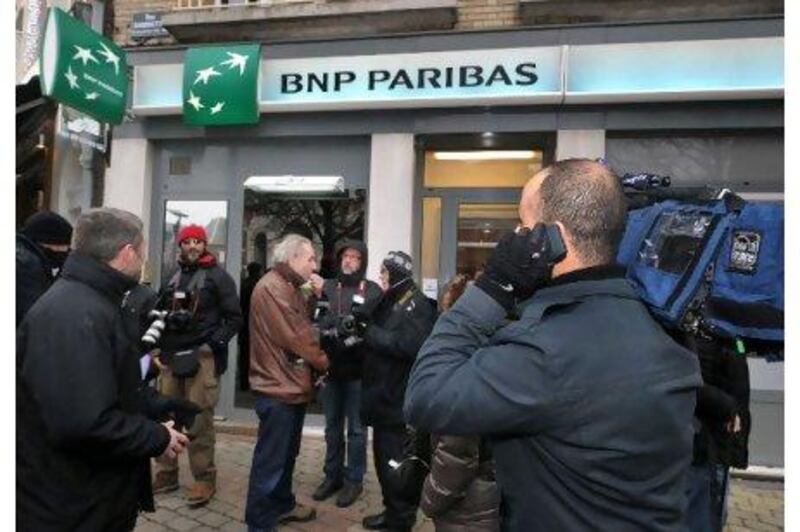PARIS // As King Eric, he was credited by adoring fans with magical qualities. Yesterday, the former footballer Eric Cantona, still idolised by followers of Manchester United, discovered that his powers did not extend to an ability to bring down the banking system.
Cantona's whimsical plan for a bloodless revolution, encouraging 20 million or more people globally to withdraw their money, appears to have attracted limited support.
French banks reported business as normal while the impact internationally is thought to have been negligible.
Amateur philosopher, scourge of officialdom and - since retiring from top-level sport - screen and stage actor, Cantona has always shown rebellious spirit.
But he is an improbable symbol of mass protest against capitalism. His earnings as a player were modest by the standards of 21st century superstars, who collect many times more than the £15,000-a-week (Dh87,000) basic wages he was paid at Old Trafford.
However, Cantona, now 44, has remained marketable after ending his playing career, winning lucrative deals with such companies as L'Oréal, Renault and Nike to augment his acting fees.
He wanted yesterday's so-called "bankrun" to cause havoc to banks all over the developed world. Although the immediate grievance was the French president Nicolas Sarkozy's controversial reform of the pension system, the initiative escalated into a rallying cry to ordinary people to punish the "corrupt, criminal" banking system for its role in the global financial crisis.
In an interview with the website of the French newspaper, Presse Océan, based in the Atlantic port of Nantes, Cantona - perhaps hoping to give a new dimension to one of his footballing nicknames'Eric the Red' - said: "If you want to talk about revolution, there is no point in taking up arms and killing people.
"There is something very simple we can do. The system is based on the power of the banks. If 20 million people withdraw their money, the system collapses. No need for weapons, or blood or anything."
With an eye to the potential impact on banks' stability if television footage showed long queues outside branches, a scriptwriter, Géraldine Feuillién, took up his challenge.
She launched a website, Bankrun2010, urging a day of cash withdrawals and, aided by the internet, the message soon spread to other parts of the world.
To the intense irritation of bankers and ministers, she suggested the international banking system had been so weakened by the world financial crisis that serious consequences could follow even if fewer than the millions envisaged by Cantona took part.
Clips of Cantona's interview have appeared on YouTube and been seen by hundreds of thousands of viewers, hardly the biggest hit the video-sharing site has experienced but enough to prompt politicians to accuse the former player of irresponsibility.
But criticism from authority has rarely troubled a man remembered for long bans for insulting French football administrators during a disciplinary hearing and a notorious kung fu assault on an English supporter who hurled abuse at him as he left the field having been sent off for violent conduct.
Cantona told the French newspaper Libération, itself founded by veterans of the Paris spring of 1968 when students joined workers in trying to topple Gen Charles de Gaulle, he would withdraw his own money. "In view of the strange solidarity which is developing, yes I will be there on December 7."
So was he there?
He spent much of the day avoiding the press, which took some pleasure in pointing that his wife Rachida Brakni, an actress, had recently earned useful income from the LCL bank for her role as a mortgage customer in a television advertisement.
French media reports quoted a BNP Paribas official at Albert, in the Somme, as saying Cantona had warned the bank last week that he would be making a withdrawal of more than Dh7,350, the threshold for such notice being given.
The bank was as prepared as it would be for any customer in similar circumstances, he said. A financial website said Cantona had also decided to take out a much larger sum - Dh3.67 million - from a different bank where he holds deposits.
Despite claims from the StopBanque protest group that at least 16,000 people in France were committed to removing deposits, few visibly carried out the threat yesterday.
In Paris, some protesters marched in fancy dress to a Parisian branch of Société Général to take out money which they then paid into the more favoured Crédit Coopératif.
The French budget minister Francois Baroin described Cantona's campaign as "comic if it were not tragic" but also, in an interview with France-Soir newspaper, "grotesque and irresponsible".
And the EU economic affairs commissioner, Olli Rehn, declaring himself a Manchester United supporter, told reporters: "I think Mr Cantona is a better footballer than he is an economist."







